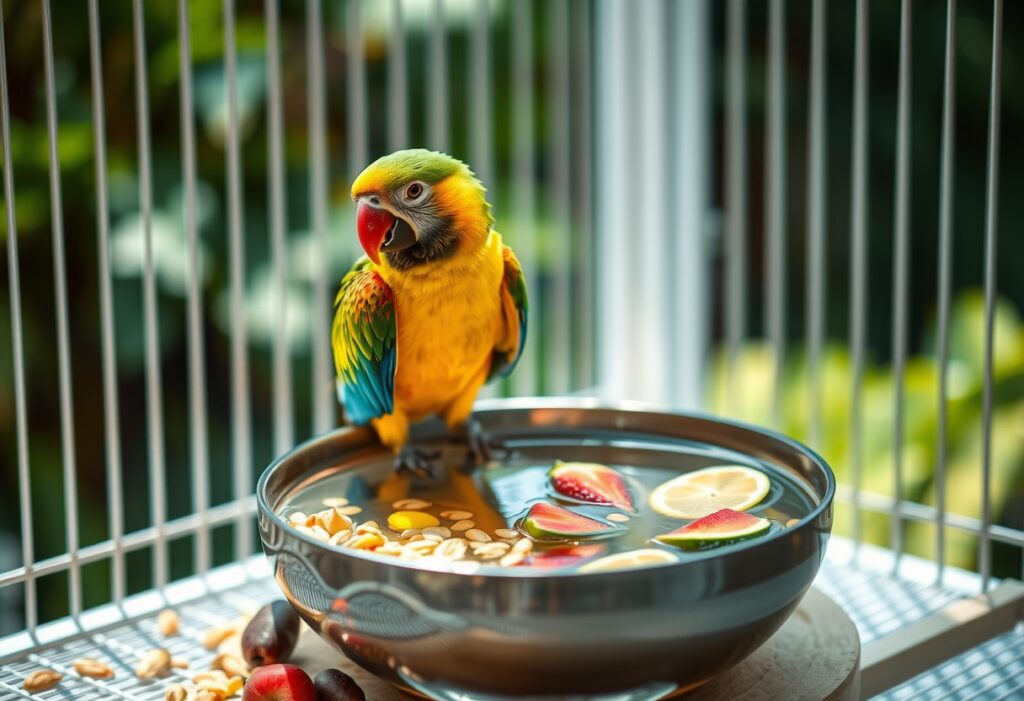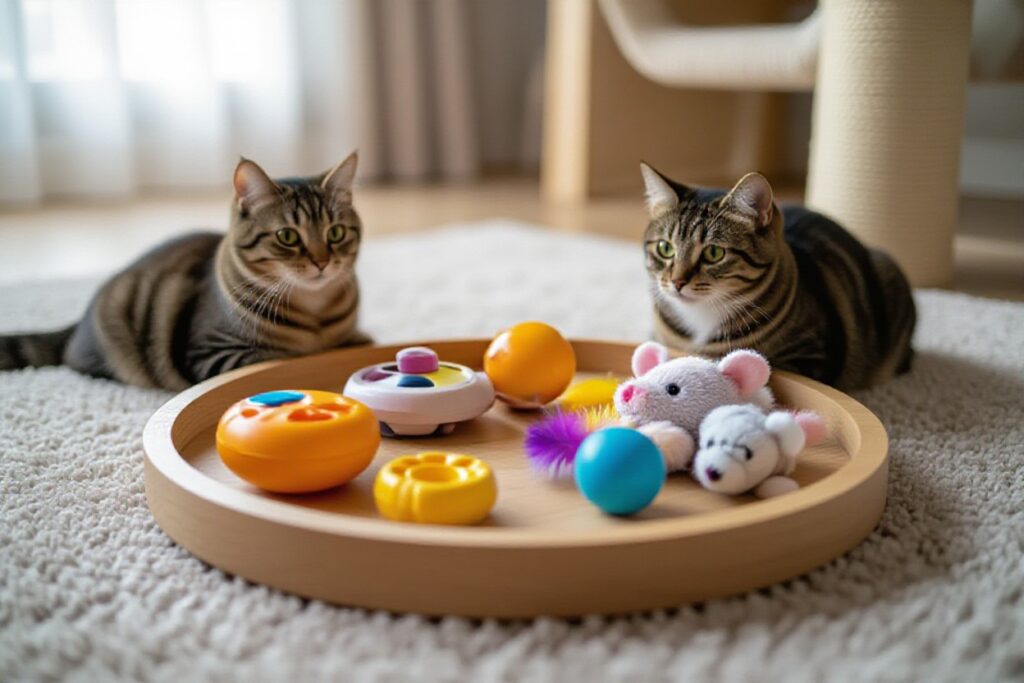There’s no understating the importance of hydration in your birds’ overall health and nutrition. As a bird owner, you must understand that water plays a crucial role in digestion, nutrient absorption, and maintaining vitality. Without adequate moisture, your feathered friends can suffer from severe dehydration, leading to serious health issues. By ensuring your birds have constant access to fresh, clean water, you not only promote better health but also enhance their quality of life. In this post, we will explore how hydration impacts your birds’ well-being and offer practical tips for maintaining their hydration needs.
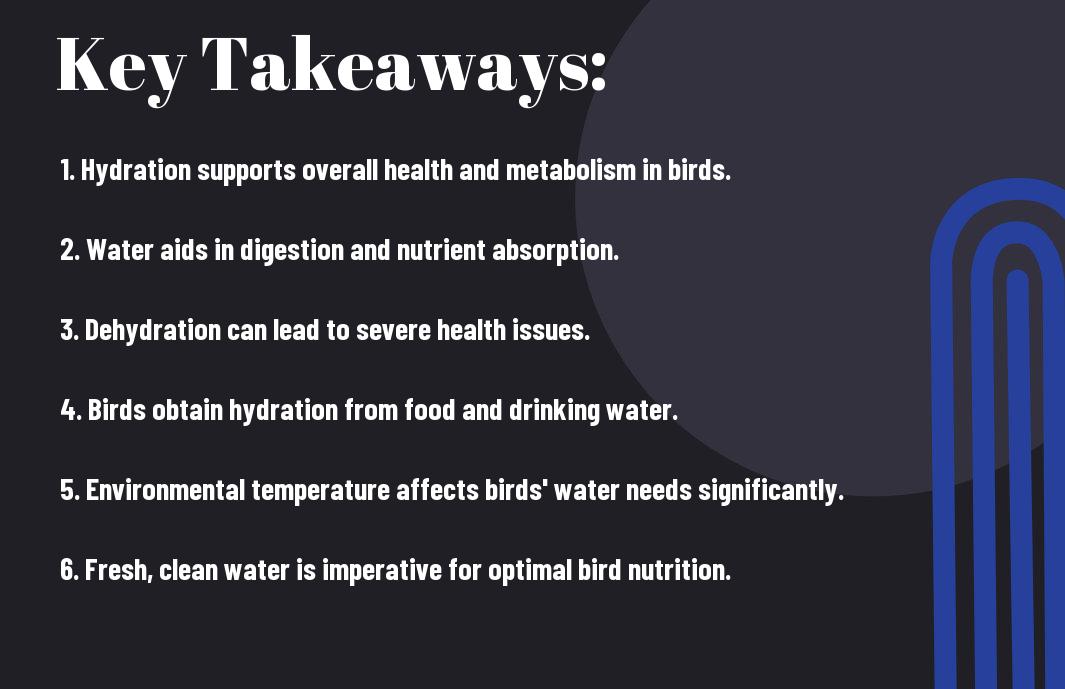
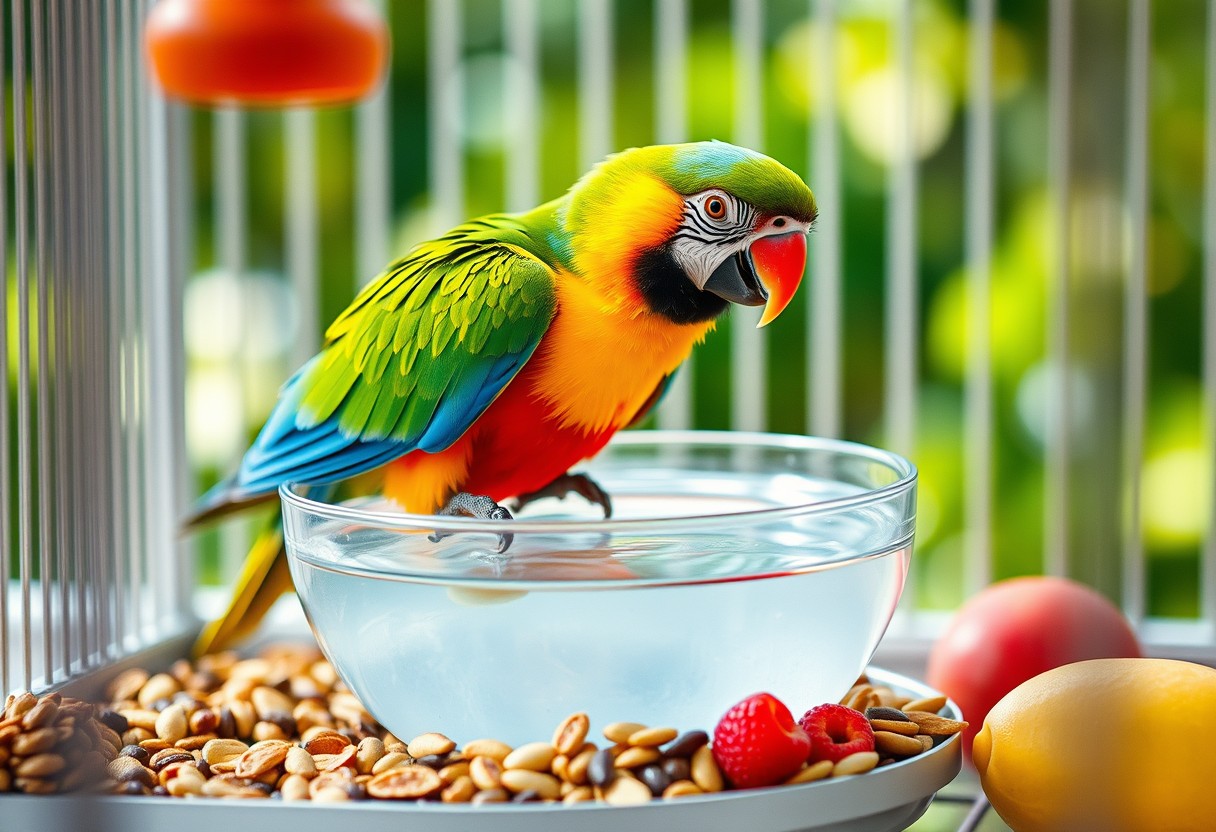
Importance of Hydration in Bird Nutrition
The role of hydration in bird nutrition cannot be overstated. Proper hydration is vital for birds to maintain optimal health, support physiological processes, and ensure survival. Water is not just a basic element; it is a critical component of every aspect of a bird’s life, from digestion to temperature regulation. Understanding how hydration impacts bird nutrition will enable you to better care for your feathered friends and ensure they thrive.
Role of Water in Metabolism
Any living creature relies on water for metabolic processes, and birds are no exception. Water acts as a solvent in the biochemical reactions that occur in a bird’s body. It facilitates the digestion of food, the absorption of nutrients, and the transportation of those nutrients to cells. Additionally, water plays a crucial role in flushing out waste products and toxins. This means that ensuring your bird has continuous access to fresh water directly influences its overall health and vitality.
Moreover, hydration is vital for thermoregulation in birds. When birds become overheated, they rely on water for evaporative cooling, which is vital for maintaining a stable internal body temperature. Without adequate hydration, birds can suffer from heat stress and, in severe cases, even death. Therefore, as you consider the nutritional needs of your birds, remember that **water is as vital as the food they consume**.
Hydration Needs Across Different Species
Water requirements vary significantly among bird species based on factors such as size, habitat, and activity level. For instance, larger birds such as parrots may require more water than smaller species like finches, particularly when they are in active stages, such as breeding or molting. In addition, birds that live in arid environments, like the desert-nesting quails, have adapted to extract moisture from their food, yet they still need access to water sources to thrive. Understanding the specific hydration needs of your bird species will help you provide an environment that meets their wellness requirements.
Plus, **monitoring water intake** is crucial. **Signs of dehydration** in birds can include excessive lethargy, dry beak and mouth, and abnormal droppings. Addressing hydration needs promptly can prevent serious health issues and ensure your bird remains energetic and vibrant. Providing a consistent supply of clean drinking water is your best defense against dehydration-related illnesses. Always take the time to educate yourself on the specific needs of your birds, and ensure they have all the necessary resources for good health and vitality.
Sources of Water for Birds
Clearly, understanding the sources of water available to birds is fundamental in ensuring their well-being and proper hydration. Birds, much like humans, require a consistent supply of water to maintain their physiological functions, support their feather health, and aid in digestion. The sources from which birds obtain water can broadly be divided into two categories: natural water sources and water from food sources. Both of these play vital roles, particularly in different environments where water availability can vary significantly.
Natural Water Sources
Water is naturally found in various environments and can include sources such as rivers, lakes, ponds, and streams. Additionally, rainwater can provide a fresh supply of water that is vital for avian species. These water bodies are crucial for birds, as they not only provide hydration but also serve as habitats where birds can forage and interact socially. It’s important to remember that polluted water from industrial or agricultural runoff can be detrimental to birds, leading to health issues. Therefore, ensuring access to clean and fresh water sources is vital for their survival.
Water from Food Sources
With a diverse diet, birds often obtain a significant amount of their hydration through the foods they consume. Many fruits, vegetables, and insects contain high water content, which allows birds to supplement their direct water intake. For instance, berries, melons, and leafy greens not only provide vital nutrients but also contribute to a bird’s daily hydration needs. Thus, incorporating water-rich foods into their diet is crucial for maintaining their hydration levels, especially during times when natural water sources are scarce.
Natural hydration from food sources is an important aspect of a bird’s diet that you should not overlook. Dark leafy greens, citrus fruits, and succulent vegetables can deliver vital moisture alongside vital vitamins and minerals. This entire aspect of avian nutrition advocates the need for a balanced diet that may vary according to the seasons and availability of particular food items. Always ensure that the food you provide for your birds aligns with their natural preferences to help them stay hydrated and healthy.
Effects of Dehydration
After recognizing the importance of hydration in bird nutrition, it’s vital to understand the implications of dehydration on your feathered friends. A lack of adequate water intake can lead to a range of issues, affecting not only their overall health but also their day-to-day activities. This is particularly concerning in birds that are often exposed to hot climates, where the risk of dehydration significantly increases. You may not always see the signs immediately, but the consequences can quickly escalate.
Short-Term Consequences
Effects of dehydration can manifest in various ways for your birds. You might notice a decrease in activity levels, lethargy, and a significant drop in appetite, which can all be alarming signs. Additionally, your bird may exhibit behaviors such as excessive preening or a fluffed-up appearance, both of which can indicate discomfort. If left unaddressed, these short-term symptoms can lead to more severe health complications.
Furthermore, dehydration can impair your bird’s ability to regulate its body temperature effectively. This is crucial since birds rely on behavioral adaptations, such as seeking shade or changing perch positions, to cool down. Without sufficient hydration, these adaptations may not suffice, leading to overheating and increasing the vulnerability to heat stress, which can be fatal.
Long-Term Health Issues
To fully grasp the repercussions of dehydration, it’s important to look at the long-term health issues that can develop as a result of chronic inadequate water intake. Prolonged dehydration can lead to serious conditions such as kidney damage, metabolic disorders, and a weakened immune system. You may also notice that your bird becomes more susceptible to infections and illnesses, as dehydration compromises its natural defenses.
With ongoing dehydration, your bird may experience chronic nutrient deficiencies, which can inhibit growth and result in poor feather quality. Over time, the cumulative effects contribute to a marked decline in overall well-being. This scenario underscores the importance of ensuring access to fresh water at all times, as it plays a crucial role in maintaining your bird’s health, activity levels, and lifespan.
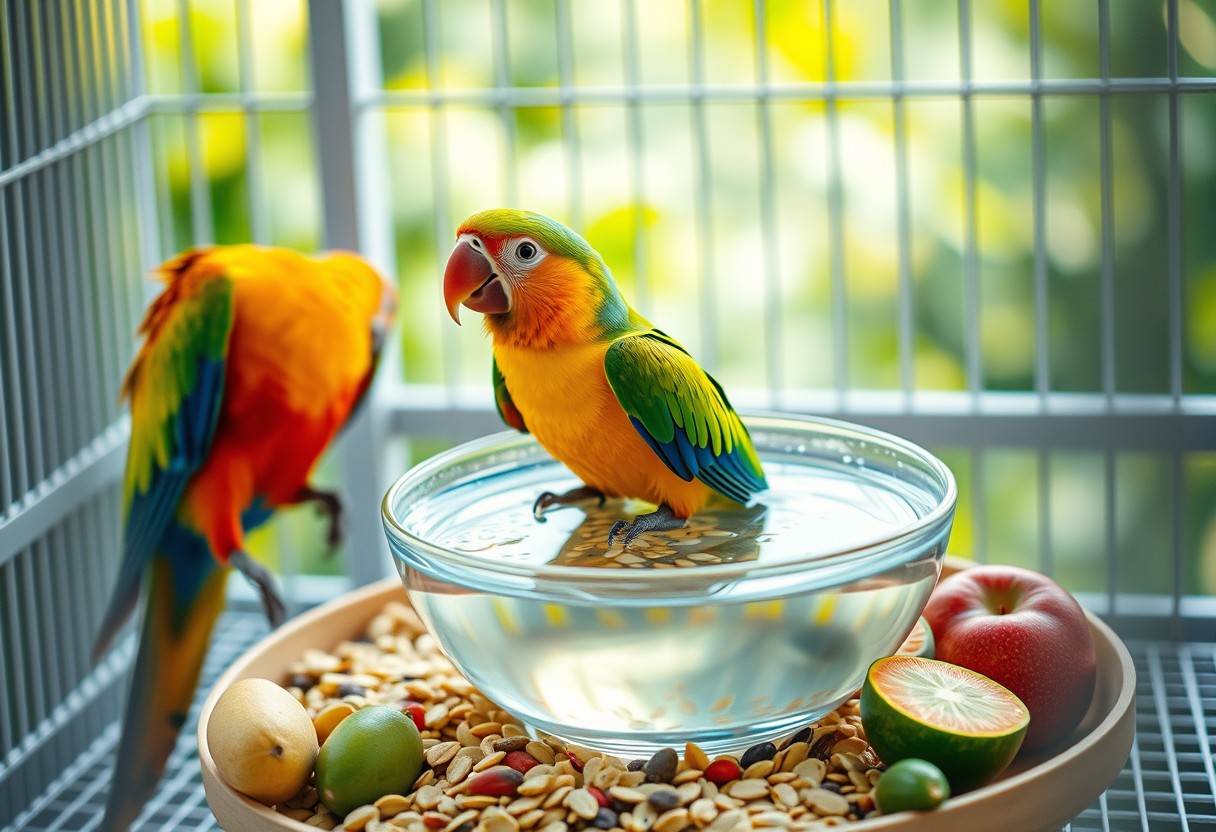
Strategies for Ensuring Proper Hydration
Once again, it is imperative to emphasize the significance of proper hydration in bird care. Without adequate water intake, your pet birds may face health complications that could lead to serious consequences. Therefore, implementing effective strategies for ensuring they remain hydrated is crucial. Here are some practical approaches to guarantee your feathered friends are getting the moisture they need.
Providing Clean Water
Providing clean, fresh water at all times is the most fundamental step in promoting proper hydration for your birds. Ensure that you replace their water daily to prevent the buildup of harmful bacteria. It is important to select water containers that are easy to clean, as dirty dishes can deter your birds from drinking. Your birds’ water supply should be accessible and located in a comfortable environment, away from drafts or excessive heat, which might discourage them from drinking.
In addition to regular water changes, monitor the water levels and the receptacle’s cleanliness. During hot weather or when your birds are more active, you may need to refill their water more often. Keep a close watch on their drinking habits; if you notice a decrease in their water intake, it may signal distress or illness, and you should address it promptly.
Encouraging Water Intake Through Diet
One effective method to enhance your birds’ hydration is by incorporating moisture-rich foods into their diet. Fresh fruits and vegetables, such as cucumbers, watermelon, and leafy greens, can provide imperative water content. When you offer these foods, you make hydration more appealing and enjoyable for your birds. Additionally, some birds may prefer particular textures or flavors, so observing their preferences can help you tailor their meals accordingly.
It is vital to recognize that the balance of solid food and hydration plays a significant role in your birds’ overall health. While you encourage water intake through fresh produce, make sure to include a varied diet to meet their nutritional needs. If they exhibit signs of dehydration, such as lethargy or dry feathers, you should consider adjusting their diet or consulting a veterinarian. Always strive to create a routine that ensures both adequate water supply and nutritious meals for your birds, safeguarding their health and well-being.
Final Words
With this in mind, you should recognize that hydration plays a critical role in maintaining the overall health and nutrition of your birds. Proper hydration not only aids digestion but also supports metabolic functions, feather health, and immune system performance. By ensuring that your birds have constant access to clean water and hydrating foods, you enable them to thrive in their environment. As an attentive caregiver, it is your responsibility to monitor their water intake and recognize the signs of dehydration, which can quickly become serious if not addressed.
Your understanding of hydration’s impact on bird nutrition empowers you to make informed decisions that can enhance the quality of care you provide. As you implement consistent watering practices and familiarize yourself with the hydration needs of different species, you’ll foster an environment where your birds can flourish. Remember that a well-hydrated bird not only exhibits better physical health but also enjoys a happier and more active life. Your commitment to their hydration is a vital aspect of their nutrition and well-being.
FAQ
Q: Why is hydration important for birds?
A: Hydration is crucial for birds as it plays a crucial role in various physiological processes. Water aids in digestion, helps regulate body temperature, facilitates nutrient absorption, and supports metabolic functions. Without adequate hydration, birds can suffer from dehydration, which can lead to serious health issues such as kidney damage, impaired immune function, and even death. It is vital to ensure that birds have constant access to fresh, clean water to maintain their health and well-being.
Q: What are the signs of dehydration in birds?
A: Signs of dehydration in birds can include lethargy, decreased activity levels, sunken eyes, dry mouth, and fluffed feathers. A dehydrated bird may also have skin that doesn’t return quickly to its normal position when gently pinched. Additionally, you may notice a decrease in droppings or a change in their consistency. If you suspect that a bird is dehydrated, it’s important to provide fluids immediately and consult a veterinarian for further guidance.
Q: How can I ensure my bird stays properly hydrated?
A: To ensure that your bird remains properly hydrated, provide fresh and clean water daily in a suitable container. Some birds may prefer different types of drinking vessels, such as bowls or water bottles, so it’s worth experimenting to see what your bird prefers. Additionally, offering hydrating fruits and vegetables, such as cucumbers, watermelon, and oranges, can contribute to their overall fluid intake. Regularly monitor your bird’s drinking habits and consult with an avian veterinarian if you have concerns about its hydration levels.
